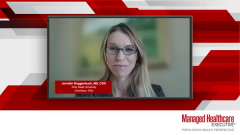
Population Health Impacted by Genetic Testing and Current Limitations in Treatment Pathways in ALS
The impact of genetic testing for ALS on a population health level.
Episodes in this series

Laynie Dratch, ScM, CGC: Public interest in genetic testing has grown exponentially. This has become apparent through individuals engaging in direct-to-consumer genetic testing for things like their ancestry and sometimes for health-related risks. But there’s also been an uptick in the availability of genetic testing for healthy individuals, such as a medically actionable panel. The American College of Medical Genetics has a list of genes that it maintains. If you have a genetic difference in these genes, there’s something you can do about your health. If there’s a difference in a BRCA1 or BRCA2 gene, we know to initiate cancer screening earlier. If there’s a mutation in a gene that’s associated with malignant hypothermia, we know to give warnings before anesthesia use. There’s been an increasing understanding of the potential benefits of population wide genetic screening.
With the newborn screen program, the benefits of early recognition and diagnosis have been recognized greatly through many diseases on the newborn screen. Babies are screened just after birth for a number of diseases that have some intervention that can be made to help with health. Right now, there isn’t population-wide screening for ALS [amyotrophic lateral sclerosis]–related genes. That may become a topic of debate in the future. If approved therapies can be initiated before symptoms develop or before diagnosis is made for genetic-focused ALS, that’s not something that’s happening now.
Jennifer Roggenbuck, MS, LGC: As far as benefits in population health, if we can identify when someone has a genetic form of ALS, that gives us the potential to identify individuals who are at risk, and they can choose to change their reproductive decision-making. We have technologies that enable patients to avoid the birth of a gene carrier, called preimplementation genetic diagnosis. We can empower the population of at-risk individuals, [so they don’t] pass on that genetic change to their children. Another way we anticipate that this information will be impactful is if we develop a neural-protective treatment that can be offered to healthy gene carriers. For example, if we know that somebody has the C9orf72 or SOD1 gene, we could offer them a medication when they’re still healthy to delay the onset of ALS symptoms or prevent it entirely. In that way, genetic testing has the potential to reduce the incidence of ALS if we can develop gene-targeted therapies and neuroprotective medications.
Currently, our genetic testing is limited in that we find a genetic cause in about half of patients with familial ALS. If someone has a family history of ALS, we assume that there’s some underlying genetic predisposition that’s operating in that family. We find it in about half of patients.
Another issue that we grapple with is that when we do genetic testing, and we identify a genetic change, we’re not sure if it’s harmful. This is a huge problem across all medical genetics. This means we’ve identified a genetic variant, but we don’t know if it’s simply a unique and harmless variant that’s carried by that family or if it could be a rare mutation that we’ve never seen. This is frustrating because patients come to genetic testing expecting to get an answer about whether they have a genetic form of ALS. We tell them, “You have a genetic variant, but we’re not sure if it’s the cause of your ALS.” This is a challenge in that our technology and our ability to identify genetic changes is ahead of our knowledge. There’s so much genetic diversity in humans that it’s going to take a long time for us to understand, in every case, whether a variant is harmless or a risk factor or causative for ALS. We have many limitations in our genetic testing that we’re grappling with.
Laynie Dratch, ScM, CGC: There are a handful of limitations for our genetic testing in ALS. One limitation is that the field of genetics is continuing to undergo a technology revolution, so our sequencing technologies will get better over time. Right now, there are some limitations to our ability to detect certain types of genetic differences. We’re getting better at that sequencing technology, but interpretation of what genetic variants mean can be extremely challenging and can evolve over time. It’s possible that an individual might have a genetic variant identified, and 1 laboratory would consider it pathogenic and another would consider it uncertain. That has drastic implications if it’s a gene that’s associated with an ongoing trial or, hopefully in the future, an approved therapy. That’s 1 of the major limitations we’re seeing: our ability to interpret genetic test results is dependent on the data we have.
Functional studies have been done in the literature to see the impact of the genetic variant on the gene’s function. Segregation studies, like in a family tree, let us see if the genetic variant tracks with the disease. These things can be harder to do in families with ALS because, unfortunately, it’s a disease that leads to death. Often, other affected family members aren’t available for things like segregation studies. Our ability to interpret results is influenced by these types of things.
Another major concern is that historically, a very diverse group of individuals have participated in genetic research studies. So our ability to understand genetic variants that we identify in individuals of diverse racial and ethnic backgrounds is limited in some ways, compared with individuals who are from White racial and ethnic backgrounds. As we continue to diversify our research and make sure that everyone is offered this option for genetic testing, our understanding will improve. But we need to be mindful of this gap and not let it continue to grow. The main limitations for genetic testing is that technology needs to continue to improve so we can detect these genetic differences. Our interpretation will continue to improve as more research is done and more individuals undergo testing.
The other main limitation is that it’s not being routinely offered to every patient with ALS at this point. We’re continuing to argue for that. That has been a recent push in the field. A great paper came out in 2022 in Brain by my colleague , arguing for the early offer of genetic testing for all patients with ALS. We’re pushing for this, but it’s not current practice across all clinics. Access is a limitation because it’s not being offered to everybody.
Transcript edited for clarity.
Newsletter
Get the latest industry news, event updates, and more from Managed healthcare Executive.






















